Il futuro sognato sotto un camion Le storie degli immigrati di Calais
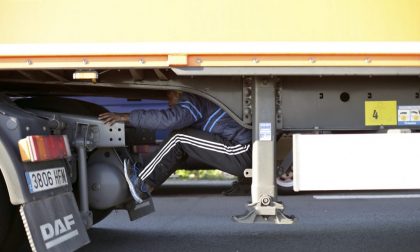
«Questo traffico è mandato dal paradiso». Non scherza Omar, 22 anni e un viaggio iniziato non si sa quando dal Sudan, col sogno di approdare, un giorno, sul suolo inglese. Calais, Francia: una protesta dei lavoratori di MyFerry Link, le navi che collegano le coste europee al porto di Dover, blocca la circolazione di camion e mezzi verso il Canale della Manica. I tir sono costretti a rallentare e fermarsi, le colonne verso il porto si fanno sempre più lunghe, i disagi si moltiplicano. Ma c’è chi, in quel caos, può vederci una situazione di cui approfittare. Sono le centinaia di migranti che puntano alle isole britanniche, e che aspettano l’occasione buona per nascondersi su un camion e tentare l’attraversata. Stazionano a Calais da tempo, una Lampedusa del centro Europa che dal 2014 ha visto crescere incessantemente l’arrivo di migranti, tanti ospitati in un campo profughi dal nome eloquente, “la giungla”.
La polizia interviene. E tra questi, appunto, c’è Omar, intercettato dall’Independent a bordo strada: è lì da martedì, aspetta l’occasione buona per buttarsi tra le ruote un camion fermo e tentare di legarsi sotto con una cintura e un uncino. Due volte ci ha provato, ma entrambe le volte è stato beccato dagli ufficiali francesi: se ti va bene, ti invitano a uscire dalle viscere dell’automezzo e ad andartene. Ma talvolta i metodi sono più ferrei, tra manganellate e spintoni. E c’è più di un automobilista britannico che dice di aver visto, mentre era in coda, gli agenti cospargere di spray al peperoncino i tir fermi, guardando poi i migranti «cascare come mosche». Ma d’altronde Omar non avrebbe altri posti dove andare, e sa che se non sarà oggi, sarà domani. E se non sarà domani, ci sarà un’altra occasione più avanti: «È il metodo che funziona. Provi cento volte, duecento volte, e finalmente un giorno riuscirai a passare attraverso i controlli e i cani da fiuto, fino in Inghilterra. Questo traffico è mandato dal paradiso. Possiamo provare molte più volte».
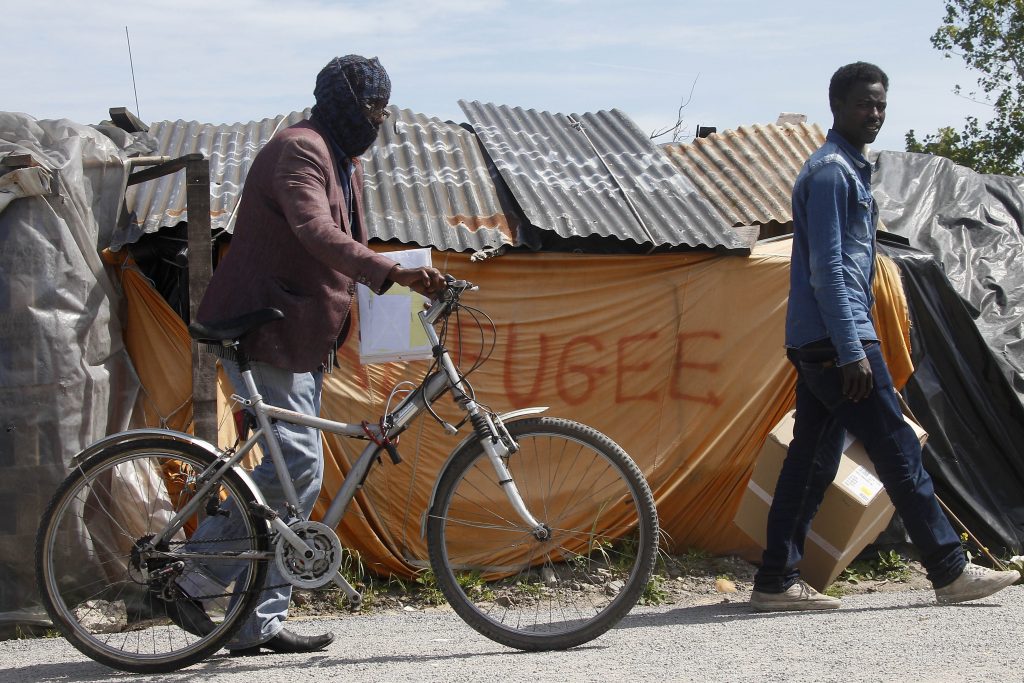
Migrants walk past a shelter at a makeshift camp known as the "jungle", Calais, northern France, Thursday, June 25, 2015. Migrants from Sudan, Eritrea and elsewhere are camped by the thousand in the port city of Calais trying to reach Britain, where they believe they will have better job prospects. (AP Photo/Michel Spingler)
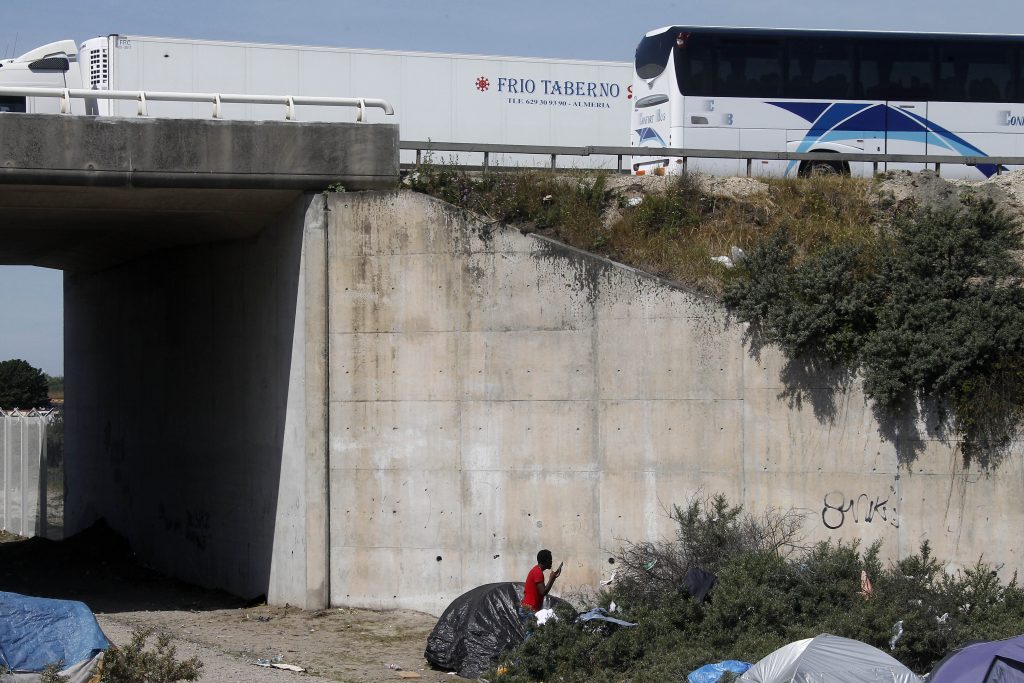
A migrant shaves his beard at a makeshift camp known as the "jungle", Calais, northern France, Thursday, June 25, 2015. Migrants from Sudan, Eritrea and elsewhere are camped by the thousand in the port city of Calais trying to reach Britain, where they believe they will have better job prospects. (AP Photo/Michel Spingler)
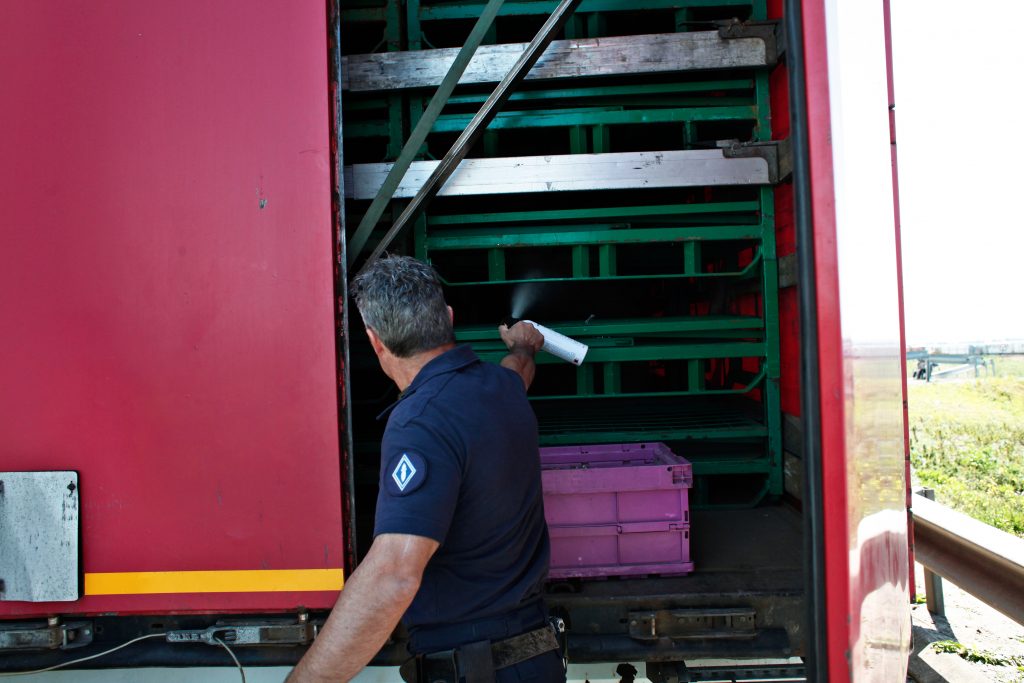
A French Gendarmerie officer sprays pepper spray in a lorry in Calais, northern France, Wednesday, June 24, 2015. Train services between Britain and France beneath the English Channel resumed Wednesday but the disruption stoked by striking French port workers the day before persevered. Adding to the chaos, illegal migrants who are camped by the thousands in the port city of Calais were seen trying to stowaway on vehicles stuck in traffic jams. (AP Photo/Thibault Camus)
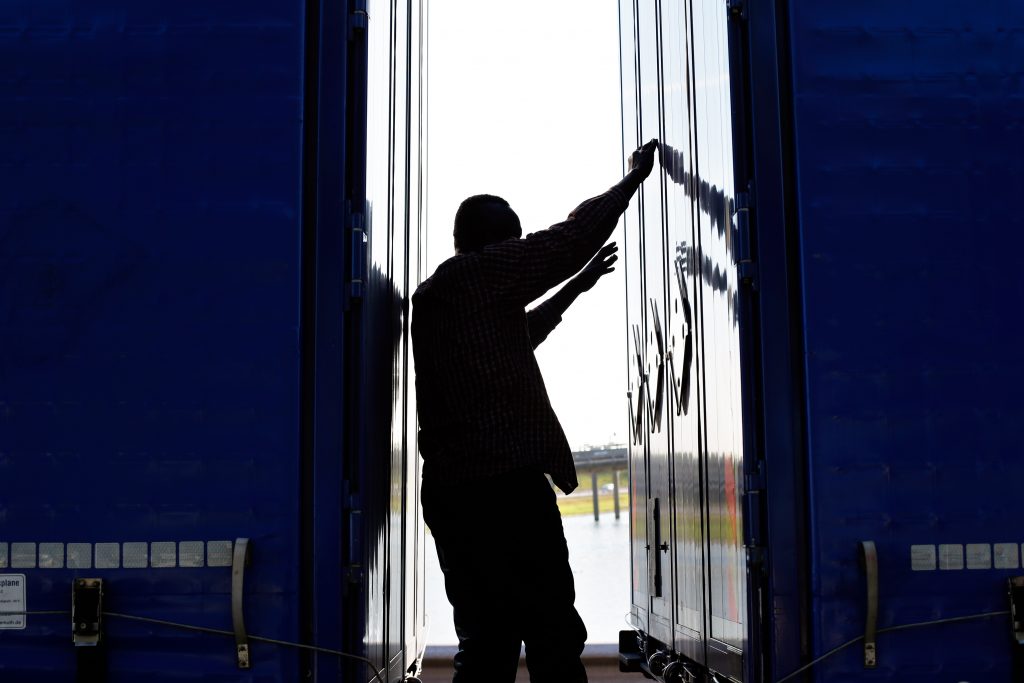
A migrant stands between two trailers of a lorry as he attempts to cross the English Channel, in Calais, northern France, Wednesday, June 24, 2015. All trains and many ferry services between Britain and France were cut off Tuesday by striking port workers, stranding hundreds of trucks and thousands of passengers on both sides of the English Channel. Adding to the chaos, illegal migrants who are camped by the thousands in the port city of Calais were seen trying to stowaway on vehicles stuck in traffic jams. (AP Photo/Thibault Camus)
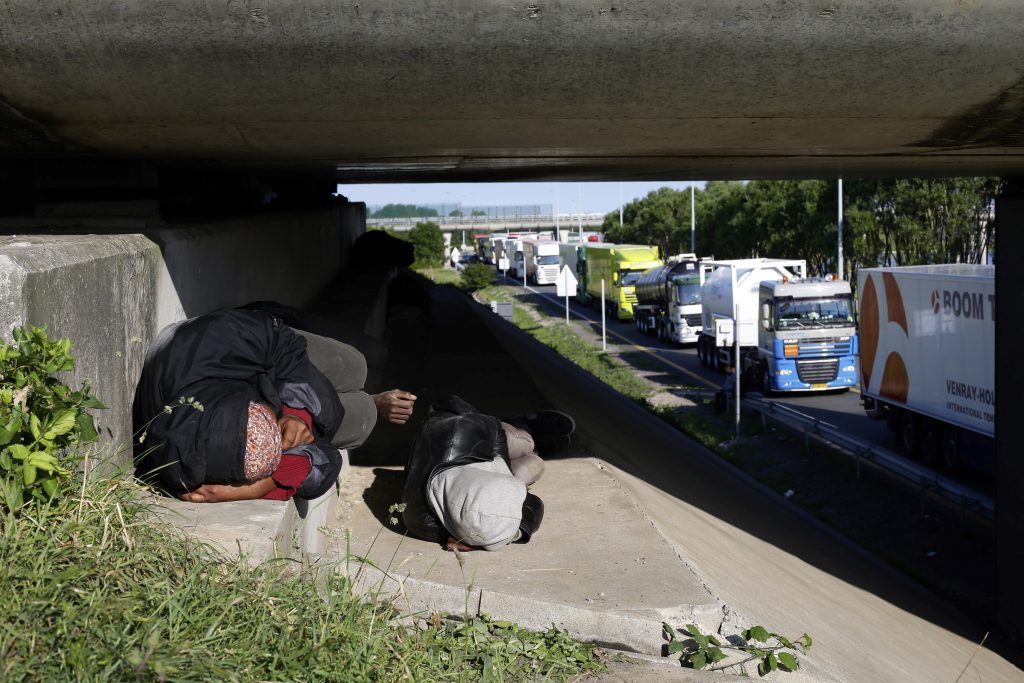
Migrants sleep along a motorway leading to a ferry port to cross the English Channel, in Calais, northern France, Wednesday, June 24, 2015. All trains and many ferry services between Britain and France were cut off Tuesday by striking port workers, stranding hundreds of trucks and thousands of passengers on both sides of the English Channel. Adding to the chaos, illegal migrants who are camped by the thousands in the port city of Calais were seen trying to stowaway on vehicles stuck in traffic jams. (AP Photo/Thibault Camus)
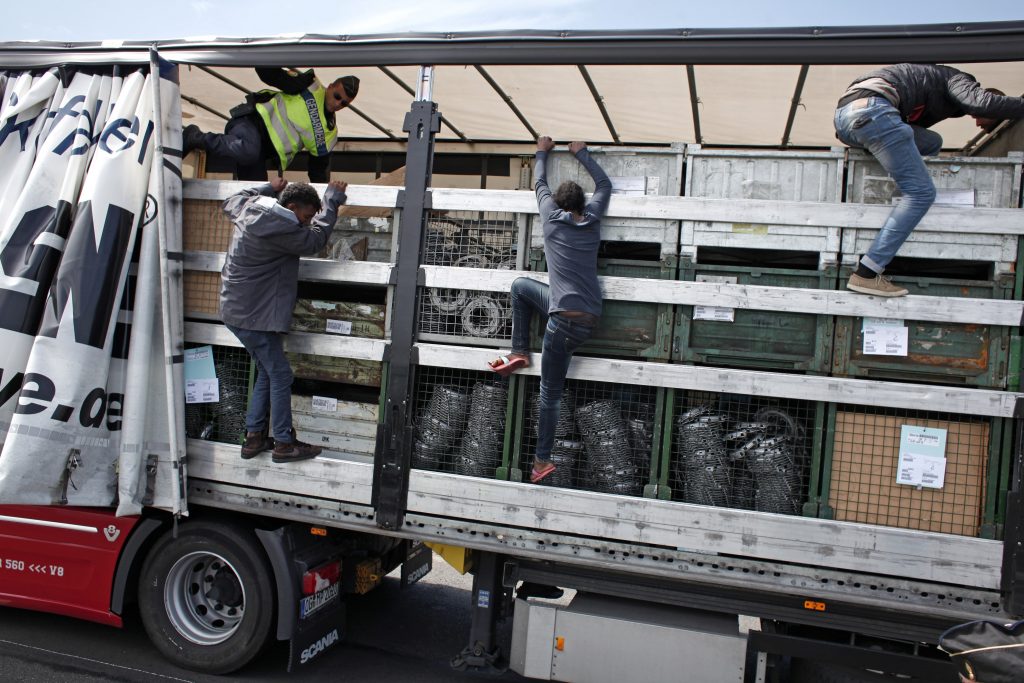
Migrants jump out of a lorry after being discovered by French gendarmerie officers as they attempt to cross the English Channel, in Calais, northern France, Wednesday, June 24, 2015. Train services between Britain and France beneath the English Channel resumed Wednesday but the disruption stoked by striking French port workers the day before persevered. Adding to the chaos, illegal migrants who are camped by the thousands in the port city of Calais were seen trying to stowaway on vehicles stuck in traffic jams. (AP Photo/Thibault Camus)
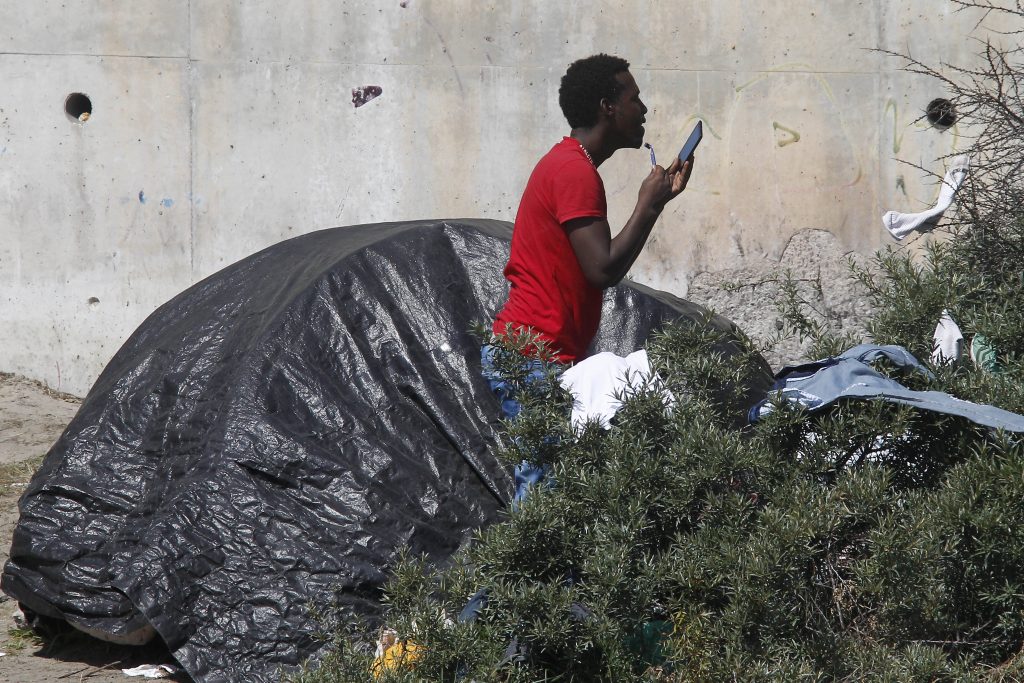
A migrant shaves his beard at a makeshift camp known as the "jungle", Calais, northern France, Thursday, June 25, 2015. Migrants from Sudan, Eritrea and elsewhere are camped by the thousand in the port city of Calais trying to reach Britain, where they believe they will have better job prospects. (AP Photo/Michel Spingler)
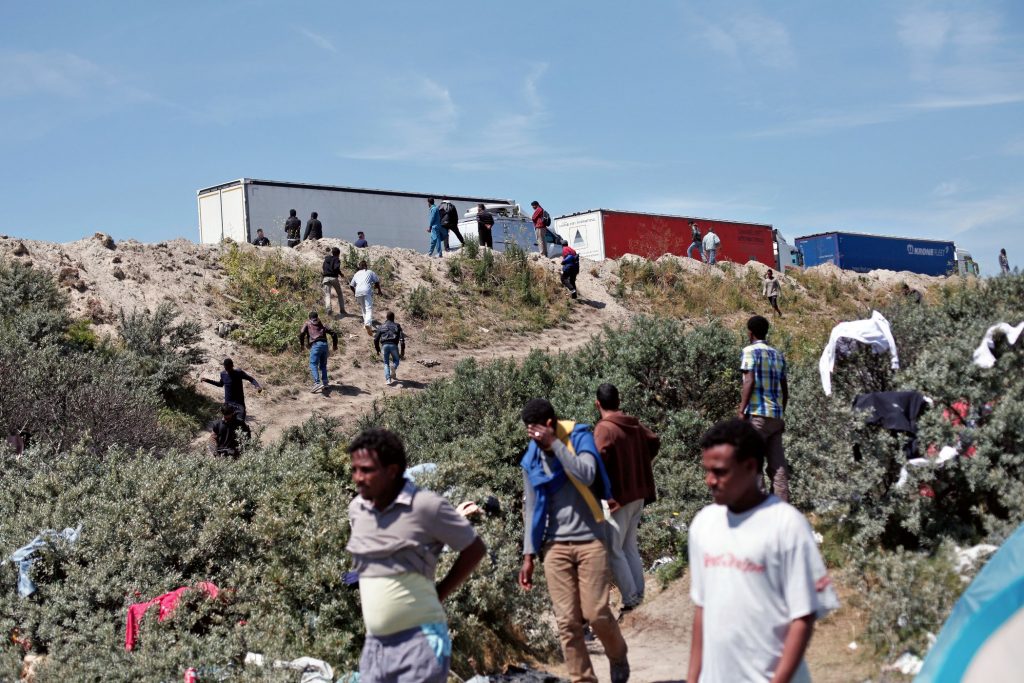
France Migrants
C'è anche chi muore. Per questo Omar rimane lì a bordo strada: i migranti stazionano a crocchi, al di là del guard rail o nascosti nei prati appena a fianco dell’asfalto. Appena un camion rallenta, gli si fiondano addosso: qualcuno cerca di forzare gli sportelli del rimorchio e a salire tra la merce, spinto dagli altri. Qualcun altro cerca un appiglio tra le ruote. Occorre fare tutto il più in fretta possibile, perché la polizia gira e guarda: ma se va male, si scappa e si ritenta più tardi. Una volta “a bordo”, però, non è ancora fatta: c’è il rischio di essere scoperti in Inghilterra, ma c’è anche il rischio di morire per strada. Come è capitato, ad esempio, ad un ragazzo eritreo, poche notti fa: si era “agganciato” male al camion ed è caduto mentre questo era in movimento, finendo travolto. Di incidenti così, purtroppo, ne capitano tanti. «È estenuante», dice Mahmood Hafeez, insegnante 35enne dalla Siria, da tre mesi a Calais, «l’alternativa però è pagare 1000 euro ai trafficanti. E io non ho 1000 euro, quindi non ho molta scelta».
La nuova "giungla". Per questo nella “giungla” gli ospiti sono diventati 3mila in pochi mesi, e si teme che i mesi estivi, solitamente i più favorevoli alle attraversate dei barconi del Mediterraneo, porteranno nuovi migranti ancora, destinati a diventare almeno 4mila. Sull’altra sponda della Manica sono preoccupati e contano: 19mila immigrati sono arrivati in questi primi mesi di 2015, più del doppio di quanto visto nel 2014. A Calais i cittadini locali non sanno più cosa pensare: «Gli auguriamo ogni bene, ma vorremmo non avere più nulla a che fare coi migranti ora. Non sono qui per dare una mano alla città e penso che la gente faccia fatica a capire perché dovremmo aiutarli ancora», dice un uomo al porto. il governo francese ha annunciato che spenderà 500mila euro per mettere in piedi una nuova “Giungla”, più pulita e ordinata, con elettricità, acqua corrente e strutture vere, a sostituire l’accozzaglia di teloni, ferro e sporcizia dove in troppi ora vivono. Ma anche da un campo più accogliente Omar e gli altri continueranno a scappare.